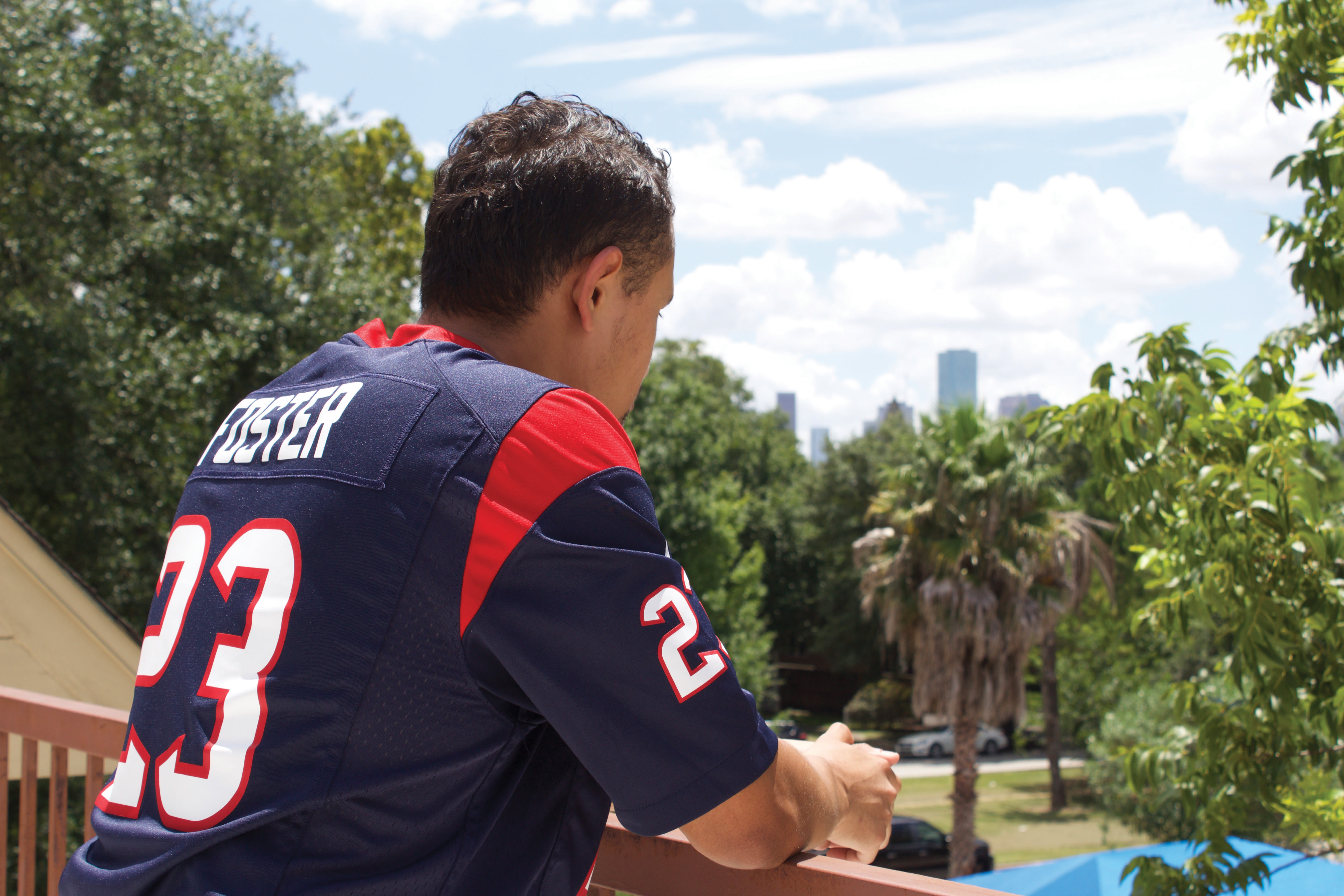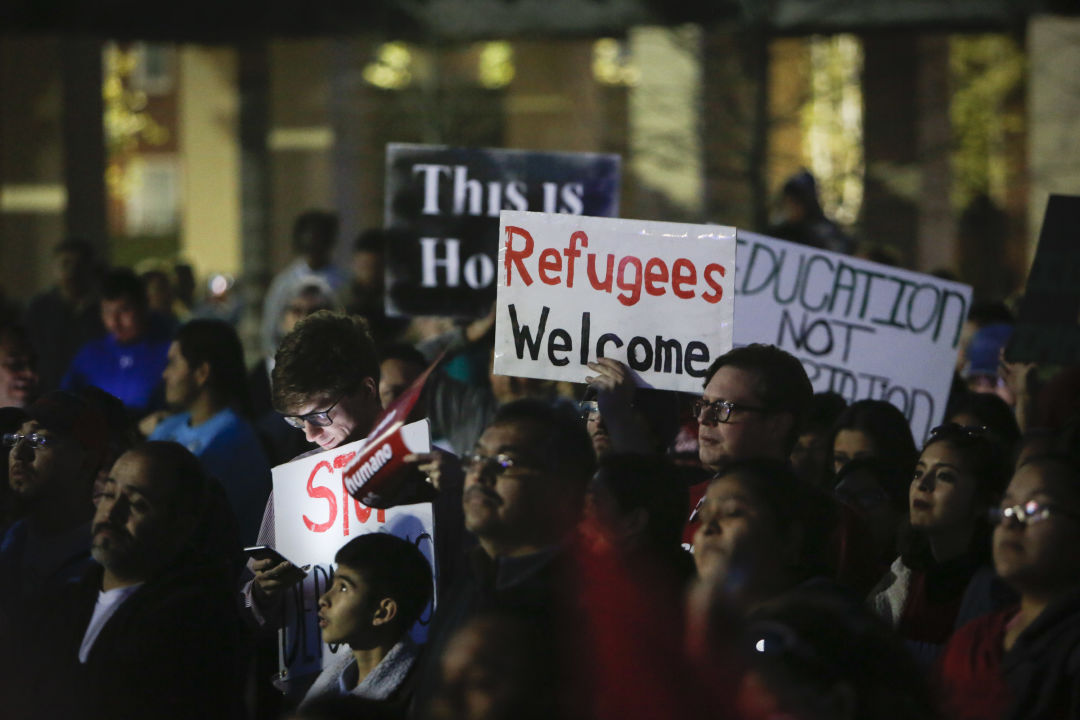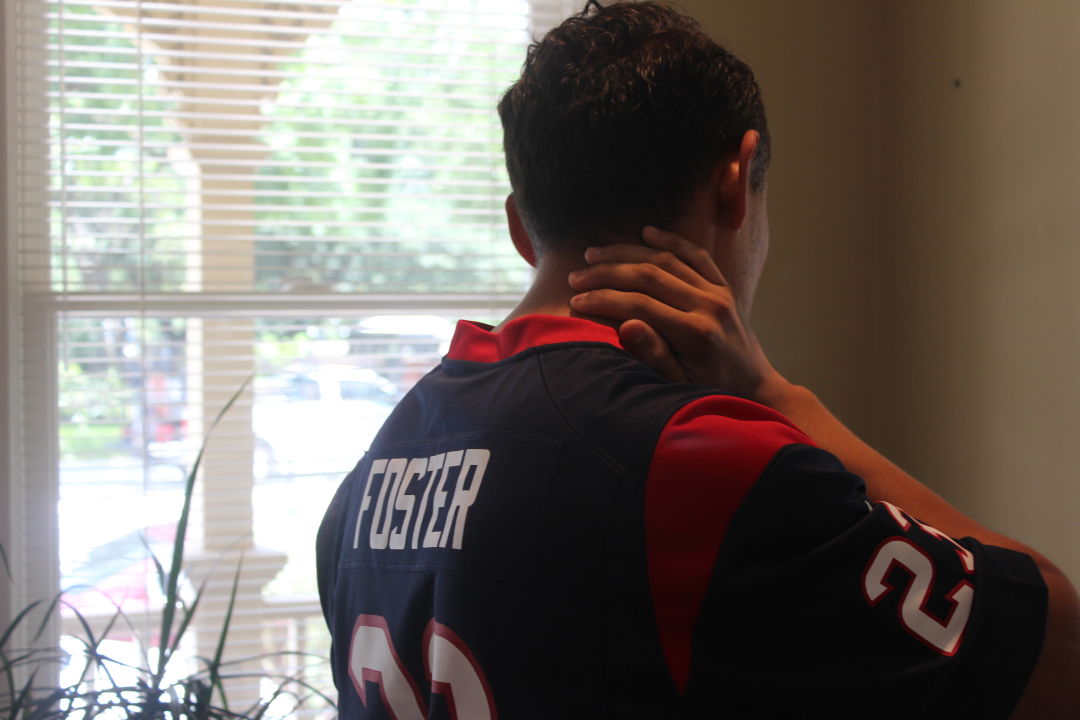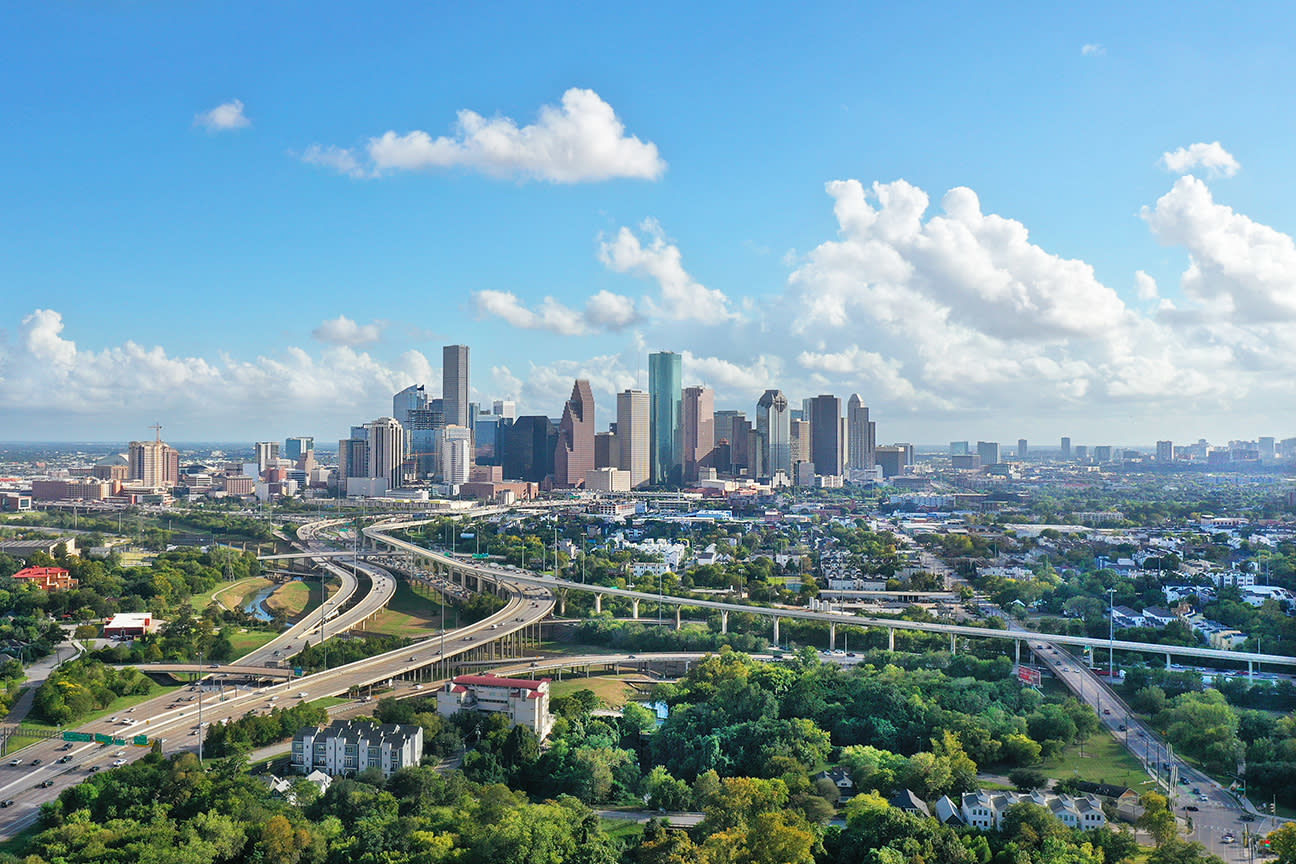
Portrait of a Young DREAMer
The last time Kelvin Parada saw his hometown of San Miguel, in El Salvador, he was 11 years old. Until then, except for the occasional vacation, Parada had spent his whole life there, along with his parents and an older sister. His childhood thus far had been unremarkable—he was a homebody, a shy kid, a yellow belt in karate—although that in itself was remarkable, given that the Paradas lived in a country plagued by one of the highest homicide rates in the world, a country decimated by gang violence, a country where 40 percent of the revenues from Parada’s father’s business typically went to extortionists, a country where millions of children faced bleak futures.
Desperate that the futures of at least two of those children—Kelvin and his sister Rosa—would be different, Parada’s parents made the difficult and painful decision to send them far away from San Miguel. In 2005, they said goodbye to their only children, setting them off on a journey that would take the pair 1,200 miles north, to Houston. Boarding the plane, Parada knew he would be living with relatives here, but not what would happen once his tourist visa expired, six months hence. He knew he’d be going to a strange school with classes taught in a strange language, but not if he would find friends like the ones he’d had back home. He knew he would see his mother and father again someday, but not when. Such was the situation in which Kelvin Parada found himself 12 years ago, as he stepped off the plane at Bush Intercontinental, having traded a world of danger and dead-ends for a world of uncertainty, an uncertainty that persists to this day.
“I went to Westbury. What about you?” he asked with a smile one hot afternoon this past June, recalling his high school years. Now 23, he is a muscular young man who speaks in barely-accented English, and atop his head was a bright red UH cap. During the hour-long interview that followed, there were moments when one could glimpse a bit of the old shyness. At other times, though, Parada was confident and determined, giving long and thoughtful answers between sips of water. A combination of swagger and anxiety typical of the young American male was much in evidence, and made perfect sense, as Parada (whose name has been changed for this story) has now lived here longer than in the country in which he was born. As a senior studying engineering at the city’s largest university, he has become the very picture of opportunity, just as his parents had hoped when they put him on that plane to Houston all those years ago. With each passing year, his character becomes more and more American, his dreams supersized. Parada has every intention of acquiring a high-paying job, in part to help support his parents, who jokingly refer to him as their “retirement.” He wants a Porsche, too. In his spare time, he likes to draw elaborate sketches of the house he plans to build for himself someday.
But dreams are complicated when you’re a DREAMer, as Parada would be the first to admit.

The crowd reacts during the rally to emphasize "A Day Without Immigrants" at Guadalupe Plaza, Thursday, Feb. 16, 2017, in Houston.
Image: Michael Paulsen
It was in 2001, four years before Parada and his sister arrived in America, that Congress first took up the Development, Relief and Education for Alien Minors Act, a bill designed to provide a path to legal residency, and eventually citizenship, for the roughly 2 million undocumented immigrants who had come to the U.S. as children, most of them with their parents, all of them here illegally. Although the DREAM Act initially garnered bipartisan support, it quickly became a political football, and despite multiple attempts over the next decade, the measure never made it out of the legislature. In 2012, however, with the stroke of a pen, President Obama directed the Department of Homeland Security to stop deporting undocumented young people, noting at the time that they “study in our schools, play in our neighborhoods, befriend our kids, pledge allegiance to our flag … It makes no sense to expel talented young people who are, for all intents and purposes, Americans.”
Although the president’s program, known as DACA—Deferred Action for Childhood Arrivals—removed the threat of deportation and allowed immigrants to work legally, it did not provide a path to either permanent residency or citizenship, and admission to the program was not automatic. Eligibility was restricted to those who had arrived in the U.S. before the age of 16, were in school or the military, and had not committed serious crimes. Nonetheless, over the next few years, more than 800,000 immigrants applied for the program.
As of March of this year, there were over 140,000 immigrants living under DACA protection in the state of Texas alone (second only to California, according to the Migration Policy Institute). Among them are Parada and his sister, who, like all DREAMers, are required to submit renewal requests every two years (at a current cost of $495 apiece). This means they must regularly fill out paperwork providing their names, current addresses and supporting documentation (e.g., expired visas) to the U.S. government. None of which seemed to concern Parada much until June of 2015, when Donald Trump, in announcing his candidacy for president, promised to “immediately terminate” DACA, calling it an “illegal executive order.” Well before the election was decided, Parada already feared he’d made a fateful mistake, that in coming out of the shadows, he’d put a target on his back. Still, Trump seemed genuinely sympathetic to the plight of DREAMers at times, and Parada remained hopeful that the new president would reconsider his campaign pledge. Until September, that is.

Image: Spencer Vogel
"We have a tradition in my family,” Parada said, recalling his early days in Houston. “At Christmas, we all hug each other at midnight. I was glad to have my cousins, but I wanted to hug my parents.”
It was the only time his voice broke during our interview, the only time he permitted himself any emotion. In the end, after coming to Houston, he and his sister did not see their mother and father for two years, an arrangement that was hard on both sides of the divided family. His mother’s feelings of loss eventually morphed into depression, and for a while she was treated with medication. By 2008, however, the pain had become too much to bear. Parada’s mother, over her husband’s objection, insisted that the couple join their children in the U.S., leaving behind a home, jobs, and the only country in which they were legally able to live.
But at last the family was together again. With money they’d saved, Parada’s parents bought another home, this time in Pearland. Neither spoke a word of English, and yet they built a comfortable life for themselves. With her son as translator, Parada’s mother negotiated for jobs as a housekeeper, and his father started a business of his own (one he was recently forced to close after suffering a disability). Even with the arrival of their third child, the family was faring better than it ever had in El Salvador.
One imagines that the Paradas were just the sort of hard-working, law-abiding, American Dream–pursuing clan President Obama had in mind when, in 2014, he proposed an expansion of DACA—called Deferred Action for Parents of Americans and Lawful Permanent Residents (DAPA)—that would have granted legal status to the estimated 3.7 million immigrant parents whose children were, like Parada’s sister, born in this country. Although DAPA, like its predecessor, did not provide a path to either legal permanent residency or citizenship, the measure was immediately decried as an amnesty initiative, and soon thereafter became the target of a federal lawsuit filed by 26 states, with Texas as the lead plaintiff. Last year, after lower courts issued rulings blocking the program’s implementation, the Obama administration appealed to the Supreme Court. The case left the then-eight-member court deadlocked, 4-4, effectively upholding the lower court ruling and killing DAPA.
Texas Attorney General Ken Paxton hailed the ruling as “a major setback to President Obama’s attempts to expand executive power,” while Obama himself called the decision “heartbreaking for the millions of immigrants who have made their lives here.”
For Parada, the ruling led to a growing and disturbing anti-immigrant backlash. “There are people who treat you differently,” he said. “Like way differently.” He didn’t mind it when an elderly patron at the Starbucks where he used to work, told him, If you’re going to speak English, speak it right, after a minor grammar mistake. She was an old lady, after all. More troubling was the casual racism among people his age, the parties where he got stopped at the door. “They will tell you, no Hispanics allowed, no Latinos allowed,” he said. “It’s happening with every race.”
Adding to the confusion were the mixed messages on immigration sent by the Trump White House during its first seven months. At a press conference in February, the president deemed some DREAMers “absolutely incredible kids,” and his administration, during its first 90 days, approved more than 17,000 new DACA applications and renewed more than 100,000 work permits. In April, Trump was quoted as saying that DACA participants could “rest easy,” and John Kelly, then the Secretary of Homeland Security, affirmed that they would not be targeted for deportation.
The president’s supporters, many of whom had voted for Trump because of his anti-immigration stance, were outraged. Whether for this reason or some other, in June, the White House signaled that no final decision on DACA had been made and that DREAMers might yet face deportation. Later that month, Attorney General Paxton, this time leading a 10-state coalition, threatened to sue the federal government if the DACA program had not been canceled by fall. Then, in July, Kelly warned lawmakers that DACA might not stand up to such a legal challenge, even though he himself claimed to support the program.
The need to avoid such a challenge was just one of the reasons offered by the Trump administration when, on September 5, the president issued an order formally ending DACA. In a statement, the administration claimed that the program had led, among other things, to “the massive surge of unaccompanied minors from Central America,” some of whom had “become members of violent gangs throughout our country.” Attorney General Jeff Sessions, in his own statement, claimed that in issuing work permits to “illegal aliens,” DACA had “denied jobs to hundreds of thousands of Americans.”
From that day forward, according to the order, new DACA applications would no longer be accepted, and a phasing out of the program’s protections would begin six months later. Just hours after the announcement, however, the president seemed to waver on his hardline stance, claiming in an interview to have “great love” for the DREAMers, and expressing hope that the six-month moratorium would allow Congress to find a way to “legalize DACA,” as he put it in a tweet. The softening was likely triggered by public reaction to the order, which was angry, swift and bipartisan. Polls showed that upward of two-thirds of all Americans believed that DACA recipients should be protected from deportation, while more than half supported a path to full citizenship.
Then, on September 14, the administration struck a tentative deal with Democratic leaders in Congress, one which would protect DREAMers from deportation as part of an overall immigration-reform package that included increased border-security measures. No final agreement has yet been reached, however, and it remains an open question whether Congress can possibly strike one before the president’s six-month deadline has lapsed. Fearing that it won’t, and fearing too that the president’s position on DREAMers may shift yet again, a number of DACA recipients—along with at least a dozen states—have now sued the Trump administration over its decision to kill DACA, even as DACA’s opponents continue to threaten lawsuits because it hasn’t been killed. As of this writing, confusion over DACA’s future seemed likely to mount further, along with the anxieties and fears of DREAMers and their families across America.
Not unlike most people in this country, Kelvin Parada has no idea what will happen next. But while the possible end of DACA has left his family in a state of perpetual anxiety, he is surprisingly sympathetic to the complexities of the immigration issue. “I don’t think the borders should be open to everyone,” he said, supporting wholeheartedly the government’s efforts to deport criminal aliens, who after all are as much a threat to him and his family as to anyone else in America. And he recognized the U.S.’s right to “do whatever they want with the people trying to get in.” But he continued to hope, too, that the country would eventually come to appreciate the many contributions law-abiding immigrants like him are making, and will make, to America—and reward, not punish them, for those contributions.
“If they are doing good, at least try to help them.”
The Parada family has seen the local news reports about ICE roundups, heard the stories about DREAMers detained by ICE after their stories appeared in the media (which is why Parada declined to show his face in photographs). They know that “everything can change in a second,” as he put it. Today, Parada is a college senior nagged by his parents when he misses curfew; tomorrow, he might have to run a household and raise his younger sister. His parents “already know what can happen,” he said. “Anything. We just have to be ready.” He acknowledged, too, that his is a family in turmoil, with his parents struggling to make sense of things even as the country’s confusing immigration policy—a country where they’ve lived for almost a decade—is being debated in a language they don’t even understand.
Still, Parada himself refused to give in to fear. “You have to live your life,” he said. “You can’t be scared all the time.” If his parents are deported, he’ll work even harder to achieve the education they sent him here to get, he vowed. There isn’t a doubt in his mind that he will finish his degree, make a success of himself in this country, and fund his parents’ “retirement,” no matter where they end up. And if he himself is deported—if, that is, the Trump administration ever follows through on its promise to rid the country of DREAMers—Parada swears he will not be deterred. The die has been cast; his dreams will still come true sometime, somewhere. “They’re not stopping me,” he said, his voice measured but defiant. “I don’t have to do my dream in America. I can do it anywhere.”
And with that, Parada left our offices and returned home, quietly confident that everything would be as he left it. He’d go back to writing the paper he was finishing for school, back to the odd jobs he’d taken to scrape together the $495 needed for his DACA renewal this fall, back to doing his part to make sure that nothing had changed, and nothing ever would. Like most students, he was already looking forward to summer vacation and a family camping trip in the Hill Country. It’s how the Paradas like to celebrate the Fourth of July, and they do it every year.













































